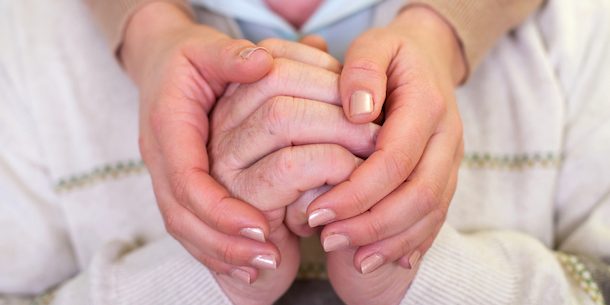“Dad came home from dinner and put one sock in the toilet. He put his shoes in the oven and the other sock on the sofa. And now he’s putting his pajama tops around his legs,” my mother whispered in one of our nightly phone conversations. The previous week she told me that my father took all the pictures off the walls. The week before that he would not stop pacing around their apartment.
“His Alzheimer’s is scary and makes me feel like I am living with a stranger,” she said after the here’s-the-bizarre-thing-dad-did-today portion of our call.
“His disease has made him a stranger,” I said, holding back tears and wondering if my dad feels like he is the one living with a stranger.
The dad of my childhood was stern, unemotional and distant. When I was thirteen and on the Bar and Bat Mitzvah circuit, I watched from the sidelines as fathers and daughters were invited to the dance floor. While my girlfriends and their dads, all watery eyes and smiles, waltzed to a recording of “Sunrise, Sunset” from Fiddler on the Roof, I sat next to mine waiting and hoping that he would ask me to dance, but he never did. We rarely interacted. Instead, my father, who worked hard and took his roles of provider and disciplinarian very seriously, preferred to communicate with my three brothers and me through our stay-at-home mom, unless it was to reprimand us for bad behavior or sub-par grades.
After my first marriage failed and I realized that I married someone as emotionally distant as my father, I worked to understand his childhood and any parallels we shared. I learned that my grandfather was also a hard worker, and was just as reticent and uninvolved in my father’s childhood as my father was in mine.
I wanted to alter the pattern I had with my dad, for me and for the two of us, so I made an effort to build a different kind of relationship with him. Instead of letting him automatically pass me over to my mother whenever I called, I engaged him in conversations about my job, my current boyfriend, or how to fix little things around the house. I told him when I struggled at work or suffered from a broken heart, and he consoled me. We grew closer as the dad of my adulthood became softer, more relaxed, and even affectionate.
We were saying goodbye at the end of one of our weekly phone calls when my dad caught me by surprise and said “I love you” to me for the first time. I do not recall exactly when that was, but he said it every time after that until Alzheimer’s stole the words from him, and consequently, me.
His disease snuck up on me. Almost six years ago, while visiting my parents in Florida for their annual Super Bowl party, my mom and I were out grocery shopping when she said to me, “I think there is something wrong with dad.”
“What do you mean,” I asked. My parents, both in their early seventies, were healthy and hale. They were still working and enjoying active lifestyles.
“He couldn’t put together a little cabinet we bought for the microwave and you know how handy he is. He tried over and over again before he finally asked our neighbor to help. And, he’s forgetful. He sometimes asks me the same question I just answered. I’m worried he’s getting Alzheimer’s, just like his mother.”
“Mom, we all forget stuff sometimes,” I said, dismissing her concerns. I did not want to believe that I was losing the father I just found.
The following day, I was in their kitchen making a cup of tea when my dad came to me with his cell phone and asked me how to turn it on. It is an older model flip phone that he has owned for years. I pointed to the button with the green plus sign. “This button turns it on,” I said, trying to sound as casual as possible. Inside, my mother’s voice from the day before was an echo of doom. My dad smiled and thanked me, then went back into the den and sat down in his TV chair. Five minutes later he found me again and we had the exact same interchange. He thanked me again and this time I hugged him and held him tight, wishing I could hold onto him forever and realizing for the first time that I could not.
Not long after that my parents went to a doctor who gave them the deadly diagnosis. My father asked my mother to not tell anyone, including my brothers and me, but she confided in us anyway and asked us not to let on that we knew. Maybe my dad was embarrassed or ashamed, holdover emotions from his childhood when older generations whispered about sickness, as though talking about it would alienate them from their friends and the rest of society.
Conversations with my father got shorter and shorter as he started to withdraw. I felt like he was pushing me away. Sometimes people do that when they feel unworthy of being loved. I will come to regret that I never told my dad that I knew, that I would love him through this disease until the day he dies and beyond, but I was too afraid of humiliating him and exposing my mother’s breach of his privacy to say anything.
Last year, my parents moved up to Northern Virginia to be near my brothers and me, but eventually, my dad’s disease progressed past my mother’s ability to care for him at home. In addition to making him confused, Alzheimer’s caused him to be belligerent, mean, and a flight risk.
The day before we moved my dad into a facility that specializes in caring for people with dementia, we took over his TV chair and hung a handful of family photographs on the beige walls of the sparsely furnished room where he will live for the rest of his life. Maybe the pictures will help him remember us for just a little longer.
To get him to the assisted-living home, my mother, brothers, and I, after a great deal of discussion and negotiation amongst ourselves, lied to him by telling him he had a doctor’s appointment. The nurse manager calls this “lying with love,” a common practice for dealing with people with Alzheimer’s. It felt more like betrayal. After we led my dad into the building on a crisp and bright blue sky October day, we were escorted through two sets of locked doors. The staff quietly coached us to walk away without saying goodbye and asked us to not visit for at least two weeks so my father could get acclimated to his new environment without being tempted to leave. They told us that his disease will allow him to adapt as though he has always lived there and that he will not remember that we banished him from his home, his wife of almost sixty years, and his faithful dog.
The nurse manager called every evening with a report. “Your dad’s integration was a little bumpy,” she said at the beginning of the second week. “He looked for the exit and asked about going home at first, but things are getting much better. He should be ready for visitors soon.”
I try to imagine what my dad must feel like and wonder if he is just as upset about his situation as I am. Maybe I should start to mourn him — the distant father of my youth and the loving father of my adult years — even though he is still living, because I feel an unrecoverable loss, an emptiness created by his wrenching displacement. The nurse manager, who hears me cry during our conversations, reassures me that my dad is adjusting. She tells me to try to see my dad’s world through his eyes, not mine. “Not only would that make the situation easier to understand and accept,” she says, “but it will make your upcoming visits more enjoyable for the both of you.” I am grateful for her advice and soon learn that she is right.
“There you are,” my dad says every time I visit, as though he has been looking for me since the last time I wandered away without saying goodbye. I always find him in one of the wide hallways on his secure floor. Sometimes he is trying to remove pictures from the walls or dragging a chair behind him from the dining room to some location that he feels would be more appropriate. He is nicknamed “the redecorator” by the friendly staff that is not fazed by the same behaviors that seemed so dangerous and disruptive at home. My dad hugs or high-fives every nurse and aide we pass as though they are his new best friends, which I suppose they are.
On one of my recent visits I found my dad, now calm and content, patrolling the halls. As always, he greeted me with a big hug and kiss and we held hands as I walked with him. This has become our new way of enjoying each other’s company, and even though we rarely talk, I feel closer to him than ever before. Eventually, we arrived at one of the common rooms where a piano player was entertaining the residents with songs from the forties and fifties. Nursing assistants were coaxing people to dance, but I remembered all those Bar and Bat Mitzvahs from years ago and was afraid to ask my dad. As the piano player started to sing “Young at Heart,” my dad stopped and turned toward the music. While still holding my hand, he snaked us through the crowd and right there, in the middle of everyone, he put his arms around me and smiled a broad, breathless smile that I had not seen since Alzheimer’s invaded our lives. In that instant I became a thirteen-year-old girl again, but this time, my dad pulled me close and led me around the dance floor while I wished the music would never end.
Become a Saturday Evening Post member and enjoy unlimited access. Subscribe now




Comments
Devra
Alll I can say is DOUBLE WOW!!!
Devra
All I can say is “DOUBLE WOW”
devra,
beautiful story and elegantly written.
Your heartfelt tribute to your father is so beautifully written with honesty and pathos….it should be a mandatory read for every family going through what you’ve experienced and continue to experience..
Thank you.
Really lovely and revealing on so many levels. May you continue to enjoy each other in new ways.
Wow Devra – beautiful and heartbreaking at the same time. Thank you for sharing this.
Absolutely beautifully written , Devra!!!
Absolutely beautifully written Devra!
Oh Devra..this was so beautifully written, and hits close to home. I am sure this will not be the last time I find myself letting your words sink in.
Devra this is so beautiful you have brought me to tears.
Beautiful- you made me cry Devra❤️